Analysis Report of Ransomware Pandora
The original report is in Chinese, and this version is an AI-translated edition.
1.Overview
Recently, Antiy CERT (member of the CCTGA Ransomware Prevention and Response Working Group) has found a number of ransomware attacks against the automotive industry. These include: Bridgestone (tyre supplier), which suffered a Lockbit 2.0 ransomware attack on 27 February, and Denso (automotive parts and systems supplier), which suffered a Pandora ransomware attack on 10 March, Snap-on (maker of automotive-related tools) and Empire Electronics (supplier of automotive lighting components) were hit by a Conti ransomware attack on March 16.
In the above incident, the Pandora ransomware came to the attention of Antiy CERT. The ransomware, which first appeared in February 2022, was spread mainly through phishing emails, vulnerability exploitation and acquisition of the victim’s system login credentials, and reverse analysis of control flow confusion and interference was set. Adopt the strategy of “double blackmail” (“Threatening exposure of enterprise data + extortion of encrypted data”), and divulge the stolen data when the system file is encrypted and the work cannot be operated normally. Through sample analysis and threat intelligence correlation, it is found that some code segments of Pandora ransomware are similar to Rook ransomware, so it is speculated that Pandora may have used Babuk’s source code like Rook, or it may be a variant or successor of Rook.
The Terminal Defense System of Antiy IEP can effectively detect and kill the ransomware and effectively protect the user terminal.
2.Recent Attacks and Family Information
Ransomware Pandora, which appeared in February 2022, had attacked Denso on March 10 and posted the stolen information on the Tor website’s data breach platform on March 13 (around March 16, the information has been deleted).
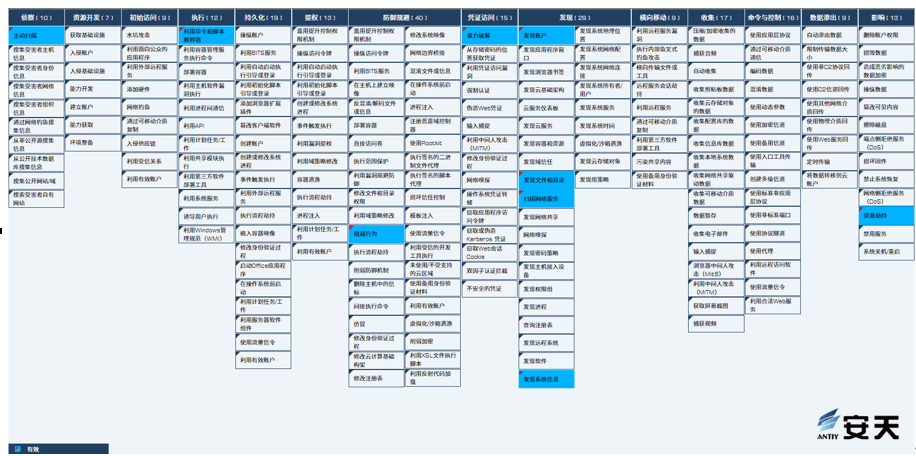
Figure 2-1: Pandora Data Leakage Platform (Partial Victim Information Deleted)1
The following is the victim’s information page before Denso’s information is deleted.
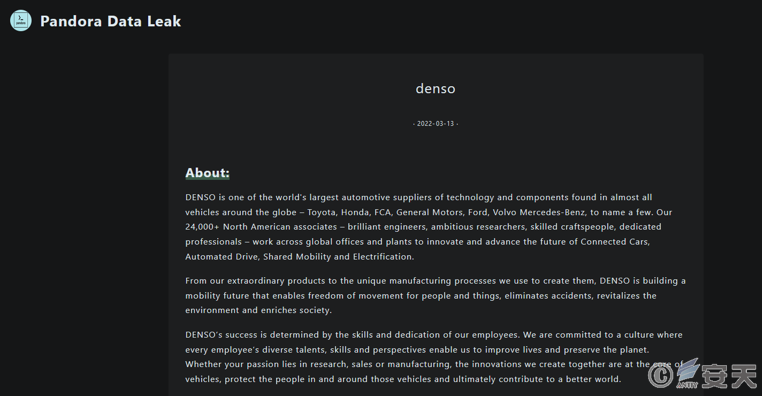
Figure 2-2 Victim Information Page
In order to prove that that data was successfully stolen from the victim’s Denso system, the attacker publish the file name of the stolen data on the data breach platform. According to statistics of open file names, the number of stolen files is 157,585.
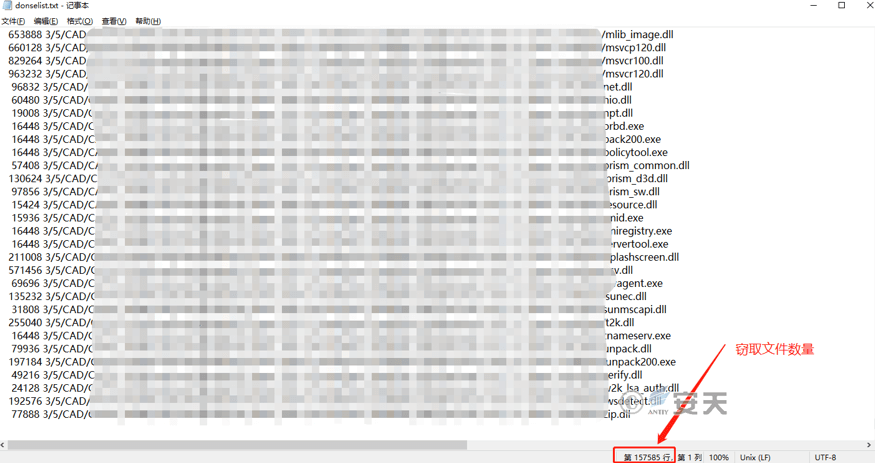
Figure 2-3 Number of files stolen
Presumably under pressure from the outside world, ransomware Pandora’ s links to the Tor victims’ pages were disabled around March 17.
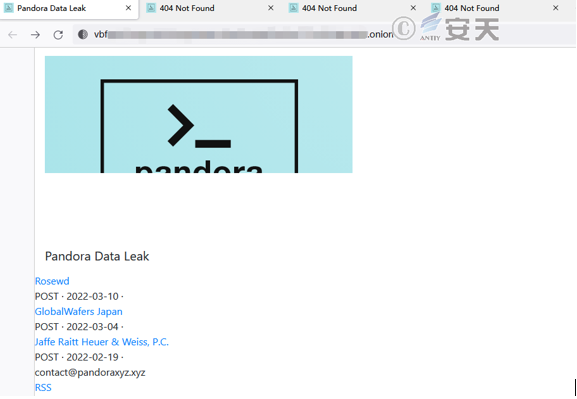
Figure 2-4 Invalid Page of Victim Information
The analysis of samples linked to threat intelligence revealed [1] that the Pandora ransomware was similar to the Rook ransomware in some code segments. The Rook appeared in November 2021, the branch of Denso had been hit by a Rook ransomware attack in December 2021, and there are claims to have previously warned that Denso’s network access credentials were sold [2], Speculation that this could also be the reason that Denso has been hit twice in four months by ransomware.
The Rook ransomware uses the Babuk ransomware source code [3]. Babuk appeared in January 2021, initially operating as a ransomware-as-a-service (RaaS), and in April the organisation issued a statement to stop operating ransomware-as-a-service, The Babuk ransomware’s builder file was leaked by an original creator in July, and the full source code for the Babuk ransomware was leaked in September. Since then, there have been different threat actors using source code to build ransomware payloads, and there have been many types of ransomware with the same attributes as the original Babuk. So presumably Pandora may have used Babuk’s source code like Rook, or it may have been a variant or successor to Rook.

Figure 2-5 Same Key Storage Location
3.Recommendations for protection
In response to the ransomware, Antiy recommends that individuals and businesses take the following precautions:
3.1 Personal protection
(1) Installation of terminal protection: Installation of anti-virus software. It is suggested that Antiy IEP users open the ransomware defense tool module (open by default);
(2) Strengthen password strength: Avoid weak passwords, and it is recommended to use 16-digit or longer passwords, including combinations of upper and lower case letters, numbers and symbols, and avoid the use of the same password by multiple servers;
(3) Change passwords on a regular basis: Change system passwords on a regular basis to avoid system intrusion due to password leakage;
(4) Timely update of patches: It is suggested to activate the automatic update function and install system patches, and update system patches for vulnerable parts such as servers, databases and middleware;
(5) Close high-risk ports: The principle of minimizing external services is to close unused high-risk ports such as 3389, 445, 139 and 135;
(6) Close PowerShell: If PowerShell command line tools are not used, it is recommended to close them;
(7) Regular data backup: Data backup of important files on a regular basis, and the backup data shall be isolated from the host computer.
3.2 Enterprise protection
(1) Open log: Open the key log collection function (security log, system log, PowerShell log, IIS log, error log, access log, transmission log and cookie log). To provide a basis for tracing and tracing the security incidents;
(2) Set IP whitelist rules: Configure advanced secure Windows firewall, set inbound rules for remote desktop connection, add the IP address or IP address range used to the rules, and prevent violent attack of non-rule IPs;
(3) mainframe reinforcement: Conduct penetration test and security reinforcement for the system;
(4) Deployment of Intrusion Detection System (IDS): Deploy traffic monitoring software or equipment to facilitate the discovery, tracing and tracing of ransomware. Taking network traffic as the detection and analysis object, the Antiy Sea Threat Detection System (PTD) can accurately detect a mass of known malicious codes and network attack activities, and effectively detect suspicious behaviors, assets and various unknown threats on the network;
(5) Disaster backup plan: Establish a security disaster backup plan to ensure that backup business systems can be enabled quickly;
(6) Safety day service: In case of any ransomware attack, it is recommended to disconnect the network in time, and protect the site and wait for the security engineer to check the computer. Antiy 7 * 24 Service Hotline: 400-840-9234.
At present, Antiy IEP can realize the detection and effective protection of ransomware Pandora.
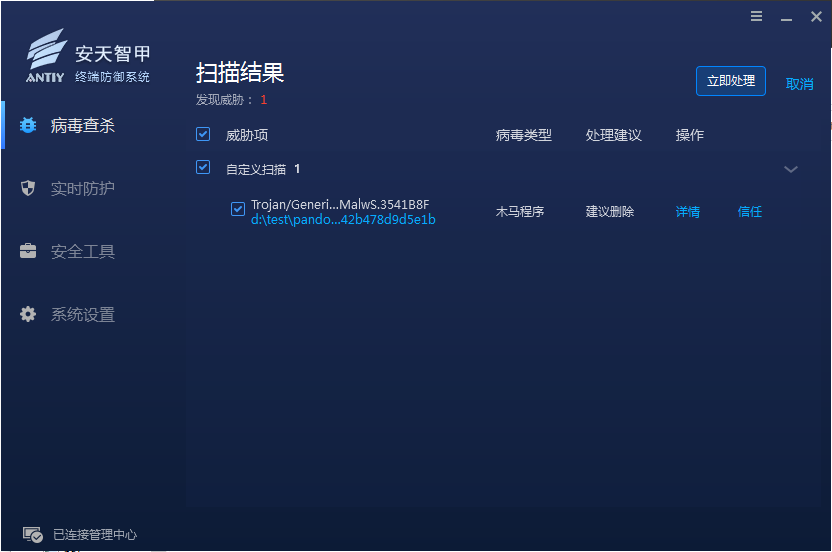
Figure 3-1 Effective protection of Atenone1
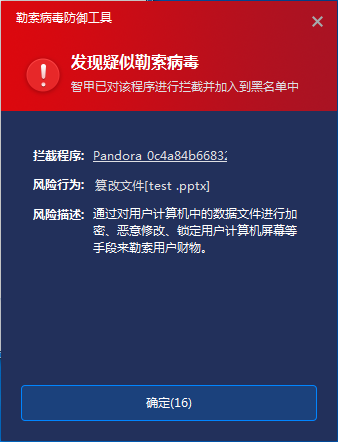
Figure 3-2 Antiy IEP prevents encryption2
4.Ransomware at a glance
Table 4-1 Ransomware Pandora overview 1
| Time of occurrence | February 2022 |
| Encryption algorithm | Aes + RSA |
| Encryption system | Windows |
| How to name encrypted files | Extension of the original file. pandora |
| Contact information | Contact @ pandoraxyz.xyz and Tor websites |
| Encrypted file type | Bypass files, folders, and file suffixes with specific names |
| Currency and amount of blackmail | After communicating with the attacker |
| Whether it is targeted | Yes |
| Whether it can be declassified | No |
| Whether internal network propagation or not | No |
| Ransom note interface | |
| Data leakage |
5.Sample analysis
5.1 Sample labels
Table 5-1 Label of Pandora Samples 2
| Virus name | Trojan [Ransom] / Win32.Pandora |
| Original file name | M3do2.exe |
| Md5 | 0c4a84b66832a08dccc42b478d9d5e1b |
| Processor architecture | Intel 386 or later processors and compatible processors |
| File size | 218.00 KB (223,232 bytes) |
| File format | Binexecute / Microsoft.EXE [: X86] |
| Time stamp | 2022-03-10 00: 39: 27 |
| Digital signature | None |
| Shell type | Upx |
| Compiled Language | Microsoft Visual C + + |
| Vt First Upload Time | 2022-03-10 12: 00: 30 |
| Vt test result | 51 / 69 |
5.2 Sample analysis
After the ransomware program is executed, first check whether there is a ThisIsMutexa in the current host, and then judge whether to continue running the program.
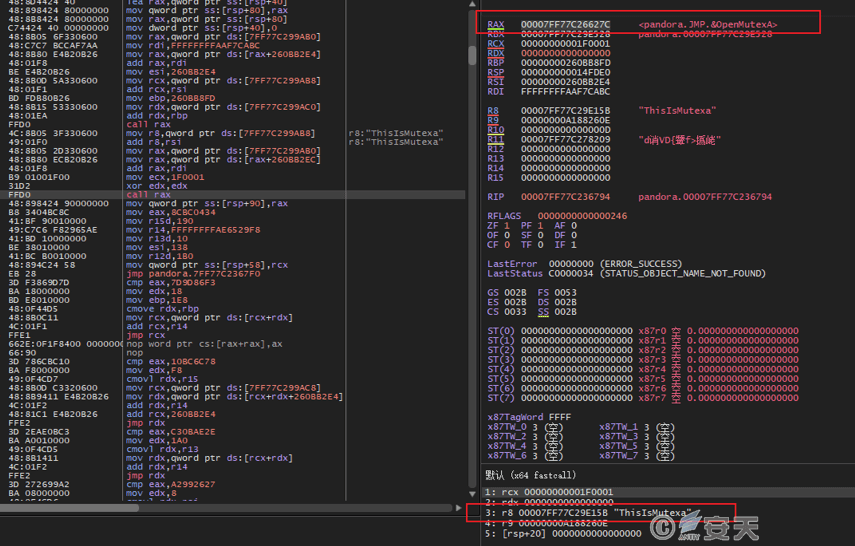
Figure 5-1 Detects whether the same mutex exists in the current host1
If that mutex ThisIsMutexa is not found in the current host, the mutex is create to ensure that only one instance is running.
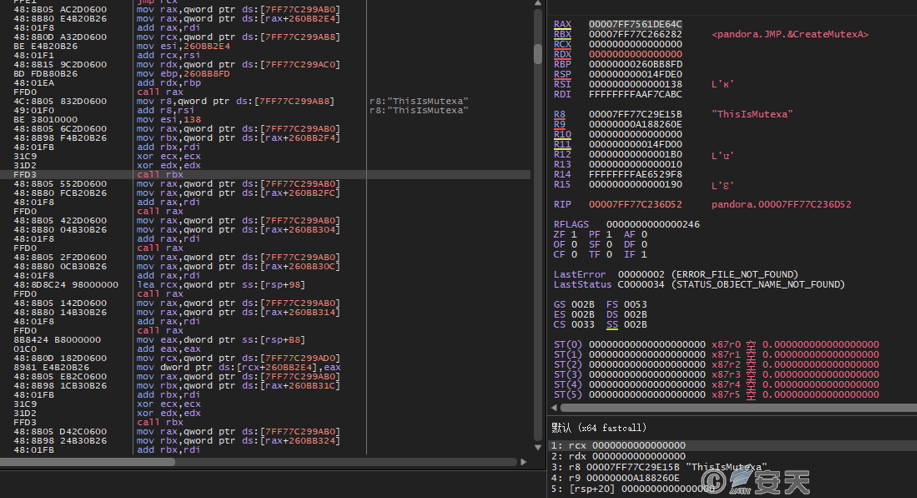
Figure 5-2 Creation of Mutex2
Generating an RSA key from the device information.
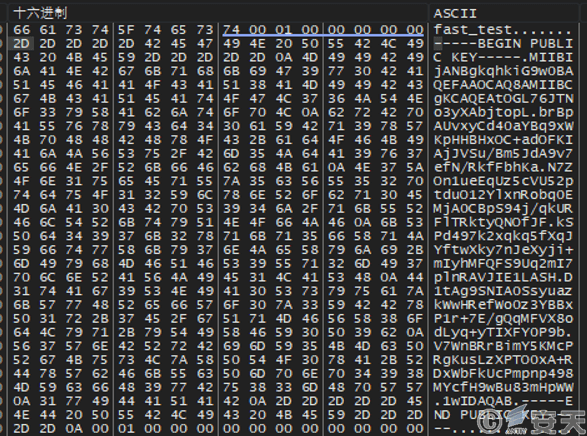
Figure 5-3 Generation of RSA Key3
Create registry keys named Public and Private under HKEY _ CURRENT _ USER\ SOFTWARE to store public and private keys.
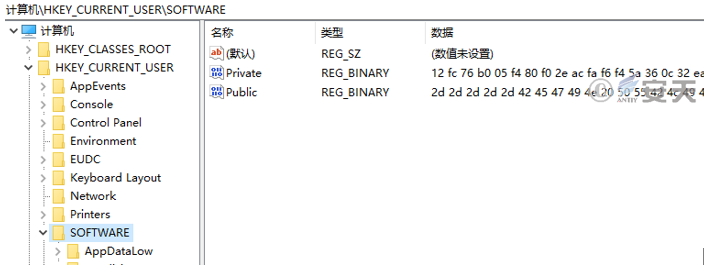
Figure 5-4 Registry Storage Key4
Set the priority when the system shuts down to 0, so that it is finally shut down when the system shuts down, and extend the execution time before shutting down to the maximum extent.

Figure 5-5 Set self-program end priority5
Delete the data in the Recycle Bin.

Figure 5-6 Emptying the Recycle Bin6
Use vssadmin. exe to delete the system shadow, so as to prevent the victim host from restoring the encrypted file by restoring the shadow.
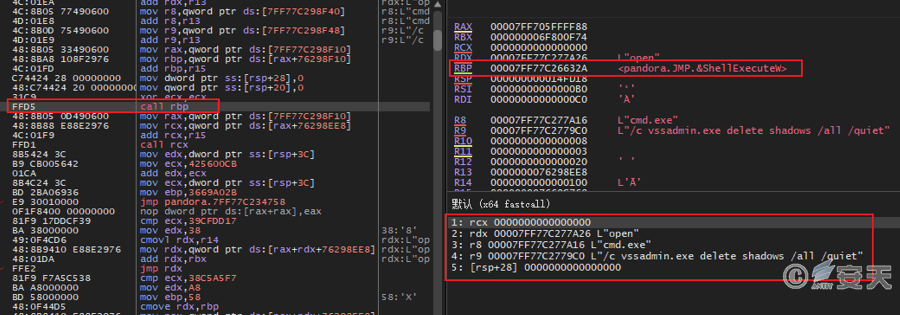
Figure 5-7 Remove Disk Volume Shadow7
Use the GetDriveTypeW function to check the type of the corresponding disk character in alphabetical order of the keyboard layout.
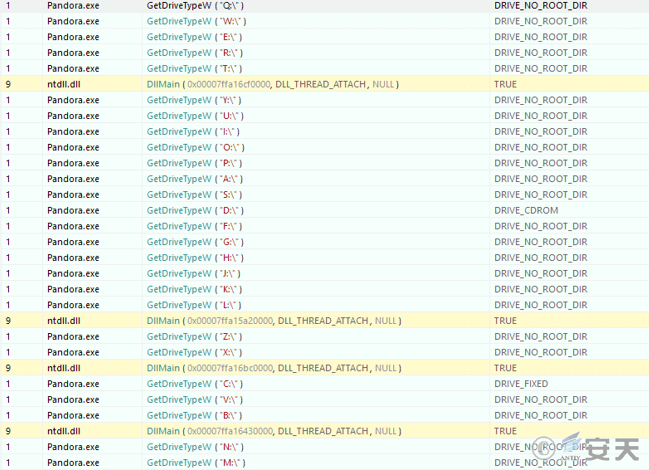
Figure 5-8 Checking Disk Type8
Bypass unencrypted folder, file name and file, the extension of the following table:
Table 5-2 Bypass Unencrypted Folders, Files, and Extensions
| File / Folder Name | Appdata | Boot | Windows | Windows.old |
| Tor Browser | Internet Explorer | Opera | ||
| Opera Software | Mozilla | Mozilla Firefox | $Recycle.Bin | |
| Programdata | All Users | Autorun.inf | Boot.ini | |
| Bootfont.bin | Bootsect.bak | Bootmgr | Bootmgr.efi | |
| Bootmgfw.efi | Desktop.ini | Iconcache.db | Ntldr | |
| Ntuser.dat | Ntuser.dat. log | Ntuser.ini | Thumbs.db | |
| Program Files | Program Files (x86) | # Recycle | ||
| File extension | .hta | .exe | .dll | .cpl |
| .ini | .cab | .cur | .sys | |
| .idx | .drv | .hlp | .icl | |
| .icns | .ico | .ocx | Pandora | |
| .spl |
A ransom note is generated when the encrypted file is finished, which contains a ransom note, contact information and the Tor website address.
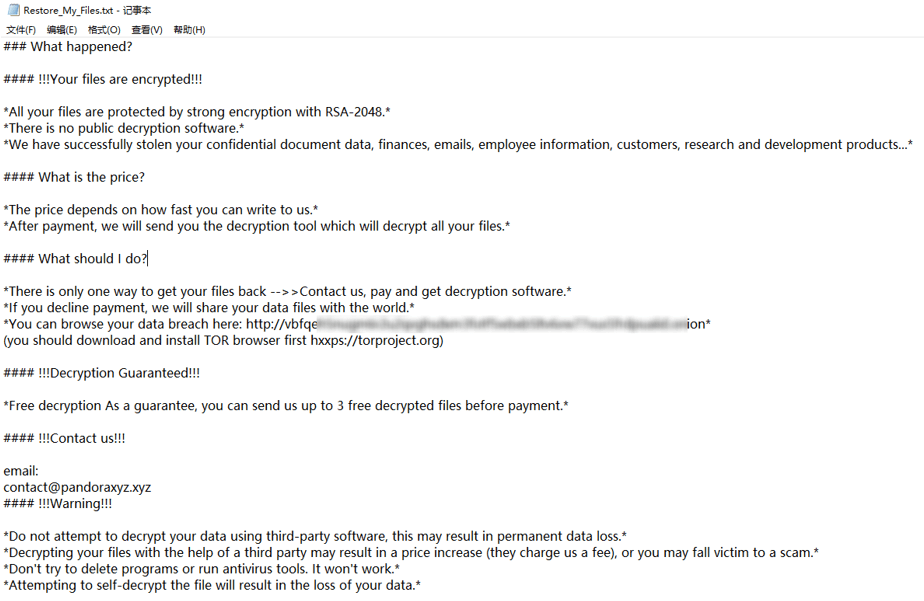
Figure 5-9 A ransom note9
6.IoCs
| 0c4a84b66832a08dccc42b478d9d5e1b |
Appendix I: Reference
- Quick revs: Pandora Ransomware – The Box has been open for a while.
https://dissectingmalwa.re/blog/pandora/
- I warned DENSO of threat actor selling access to their network
https://twitter.com/radvadva/status/1503003017150349318
- New Rook Ransomware Feeds Off the Code of Babuk
https://www.sentinelone.com/labs/new-rook-ransomware-feeds-off-the-code-of-babuk/
Appendix II: Special Working Group for Ransomware Prevention and Response of China Internet Network Security Threat Governance Alliance
The National Internet Emergency Response Center (CNCERT) has jointly established the “China Internet Cybersecurity Threat Governance Alliance Ransomware Prevention and Response Professional Working Group” (referred to as “CCTGA Ransomware Prevention and Response Working Group”) with leading domestic security enterprises. This working group focuses on ransomware prevention and response efforts in areas such as ransomware information notification, intelligence sharing, daily prevention, and emergency response. It also regularly releases ransomware updates to the official website (https://www.cert.org.cn/publish/main/44/index.html) or the WeChat official account (National Internet Emergency Response Center CNCERT).


